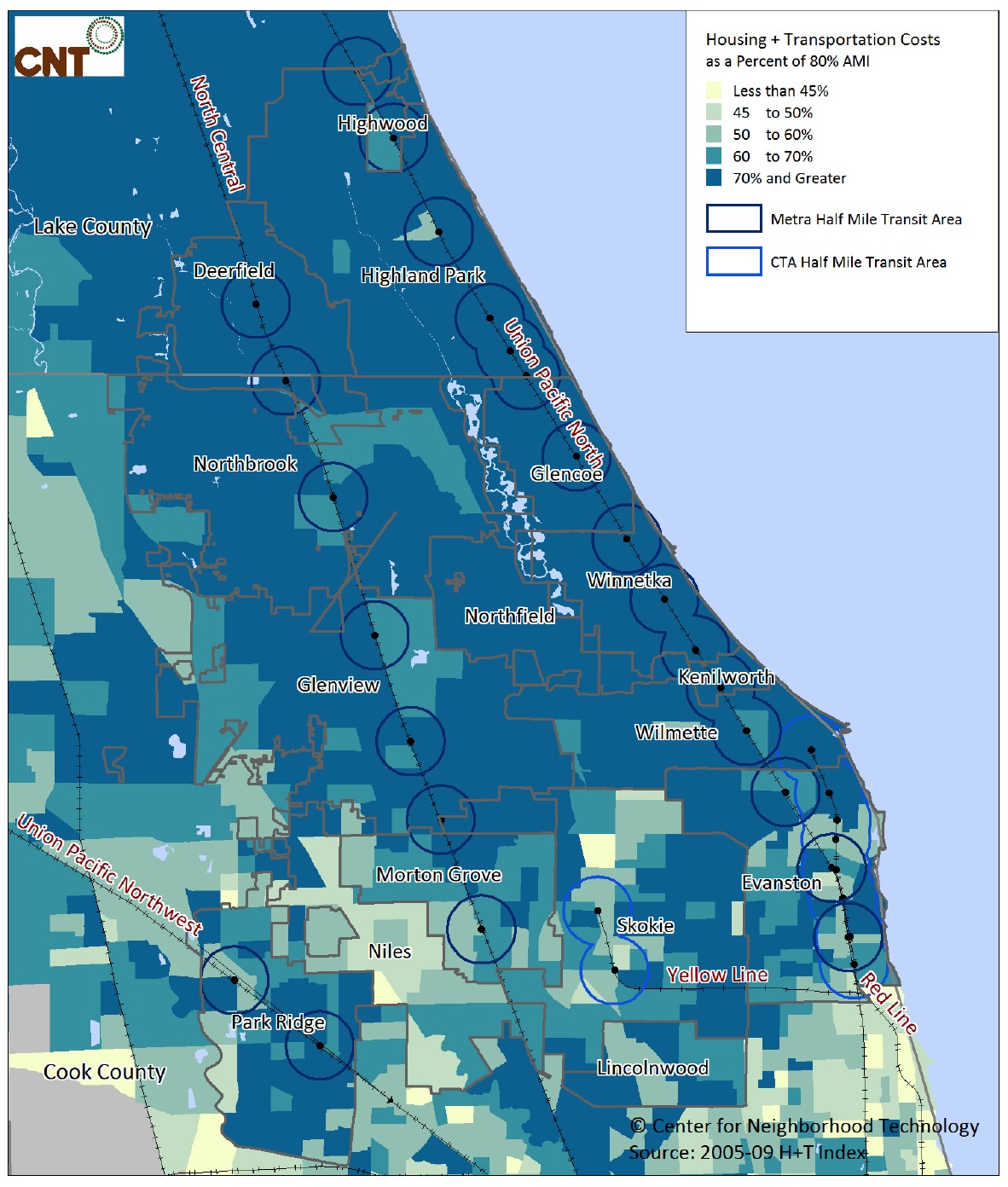CENTER FOR NEIGHBORHOOD TECHNOLOGY
OPEN COMMUNITIES
TRANSIT DEFINES THE VIBRANCY OF DOWNTOWNS IN CHICAGO’S NORTHERN SUBURBS. Metra and CTA stations, and the development they support, help commuters get to jobs and run errands on their way home, all with little or no driving. Residents come together in these downtown station areas to eat, drink, socialize, borrow library books, shop, and see their neighbors. These activity centers are the brand, lifeblood, and drivers of economic development in these communities.
Rail transit anchors downtowns and neighborhoods in many communities throughout Chicago’s northern suburbs and across the region. Municipalities have used these transit-oriented developments, (TODs), to create a sense of place, add retail and housing, and enhance their tax bases. In doing so, TOD helps reduce driving, increase access to transit, and improve the local economy.
At the same time, many of these communities are seeking new ways to accommodate residents of all family types in their housing markets. Existing residents are aging. New families struggle to find affordable units. Persons with disabilities need housing with easy mobility options. And most communities are more culturally diverse than in the past. Fortunately, the U.S. Department of Housing and Urban Development (HUD) is in the process of finalizing guidelines for communities to affirmatively further fair housing —which means, quite simply, making room for all.
Communities can address these new realities through mixed-income transit-oriented development (TOD). As this report makes clear, communities can meet the challenges of the 21st century and grow their local economies by providing fair access to housing, a balance of housing units, and an amenity-rich environment within their TODs. Why support and facilitate mixed-income TOD? Because it:
- Reduces the cost of living by helping households of all incomes own fewer cars, drive them less, and apply the savings to health care, education, or a conventional down payment.
- Connects workers with job opportunities and can help open up new career paths for households without a car.
- Reduces traffic and supports a healthy climate by reducing vehicle miles traveled and increasing transit ridership.
- Grows the tax base by spurring new development in station areas, which were the most resilient place types during the Great Recession.
- Supports diversity by reducing segregation and creating culturally vibrant neighborhoods.
All too often, however, Chicago’s northern suburbs have fallen short in efforts to add mixed-income TOD and realize the benefits that it creates. This report finds that:
- For moderate-income households in the northern suburbs, or those earning 80% of Area Median Income, the combined cost of housing and transportation now exceeds 56% of total household income.
- The supply of rentals in suburban TODs is threatened. While the northern suburbs added almost 35,000 rental units, the number of rentals declined along Metra and CTA routes.
- Where TOD has occurred, the number of rentals dramatically dropped. For example, Evanston’s Davis Street TOD added 850 owner-occupied units, but lost more than 400 units with rents below $800.
- Subsidized housing programs have not filled this growing gap. Less than one out of five federally subsidized units was near a CTA or Metra station in 2012.
Changing state and federal requirements mean that the time to act is now. The Illinois Affordable Housing and Appeal act requires communities with a dwindling supply of units to address this in planning. Proposed HUD guidelines to affirmatively further fair housing will ask Community Development Block Grant recipients to proactively promote fair access in areas with jobs, transit, and amenities.
This report lays out tools and policies that communities can utilize to meet these requirements by growing equitably around their transit assets. Programs like the Regional Transportation Authority’s Community Planning program and the Chicago Metropolitan Agency for Planning’s Local Technical Assistance program can provide some of the capacity to get there. These strategies include:
- Zoning incentives to include the production of affordable units in new development and provide avenues for developers to do so through density bonuses and reduced parking requirements.
- Financing and acquisition, from targeting Low Income Housing Tax Credits and filling equity gaps, to creating trust funds and land assembly funds.
- Targeting infrastructure investments made by state and regional agencies to high-quality, mixed-income TODs.
- Fair housing policies like affirmative marketing, multilingual management policies, and universal design.
Public participation will be critical. As suburbs all over the United States have demonstrated – places like Somerville, Massachusetts and San Leandro, California – mixed-income TOD succeeds when it aspires to residents’ vision of a community of choice: where a resident can find the unit they want, in a location they can afford, and with transportation options connected to many different career ladders. When communities and supporters of mixed-income TOD approach their neighbors with this vision through open communication and trust, mixed-income TOD succeeds.
This guide focuses on north suburban Chicago, but its approaches and tools, including leveraged public dollars, can be applied anywhere. Using this guide as part of the local planning process and implementing the tools set forth can efficiently and effectively build communities and grow economies.
Download full version (PDF): Quality of Life, (e)Quality of Place
About the Center for Neighborhood Technology
www.cnt.org
Founded in 1978, the Center for Neighborhood Technology is a leader in promoting more livable and sustainable urban communities. We research, invent, and test urban strategies that use resources more efficiently and more equitably.
About Open Communities
open-communities.org
Open Communities’ mission is to educate, advocate and organize to promote just and inclusive communities in north suburban Chicago. We work with current and prospective residents and local groups to promote economically and culturally diverse communities in north suburban Chicago. We provide fair and affordable housing counseling services, community education, advocacy, and organizing for welcoming communities.
Tags: Center for Neighborhood Technology, Chicago, CNT, IL, Illinois, Open Communities







 RSS Feed
RSS Feed